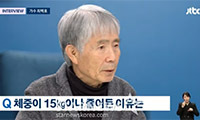▶ Psychologically Speaking
▶ By Beatrice Sool Choi
Last week, my Japanese, next-door neighbor had a garage sale. Many old things from Japan were laid out on their front yard.
Under a bright summer sunlight, discolored Japanese traditional screens, dishes, dolls, and clothes seemed to speak of their old histories.
It is about time to get rid of some old stuff because there is not enough room in my house, said Miyako who is in her mid 50s. I brought many of these things with me to this country twenty years ago. While I was cleaning up to get ready for this garage sale, I found most of these were just in the storage and never been used. Now, they are sort of outdated and no longer useful to me.
After this brief talk with her, I thought about a cultural garage sale. What are the things that we brought with us? What are some cultural baggages that we drag along? What should we keep and what should we let go? I thought it would be a good idea to open up our mind s closet to rid of outdated clutter. That way, we can prepare more room to accept waves of fresh air-like ideas.
Recently, I had a chance to treat a Korean American mother briefly. She was well acculturated with a high-level education, holding a respectable position in her profession after living in this country for more than a quarter of a century.
I am so shaken with my son s decision, said Mrs. Min. I dont know what to do. I am about to kill myself. What have I done to him? All I can think is I am a terrible failure. She was devastated.
Last July, her son broke the news that he would marry a Caucasian woman.
But that was not all, Mrs. Min went on. What shocked me was that she was a divorcee with a child. My son is a bright young man with a promising future. He is our hope. This is an incredible shame and humiliation to our entire family. I cannot accept this. Her voice choked.
Mrs. Min, like many other Korean American mothers, devoted her time and energy for her childrens education. She showed serious commitment to her children by making a conscious decision to stay home while they were growing up. She stated that she encouraged and assisted her children to be expressive, assertive and independent parallel to the mainstream culture.
Thats why I don t understand why these kind of things are happening to me, she said. Mrs. Min could not quell her unbearable emotional disappointment.
I remember what my mother taught us what to be, and that became my life motto, she said. What went wrong with him? I cannot possibly accept him as my son, and I will not see him anymore. When we immigrated to this country, we had to adapt to many new ways of thinking and our life style had dramatically changed as well. Through acculturative process, we copied and imitated the American life-style. Without being conscious about it, we followed to a wholesale adaptation to the characteristics of the majority culture like many other immigrants in this country. Certainly, children show a faster adaptation and a higher degree of acculturation.
During the process of this adaptation to the dominant culture, we unfortunately lose our original cultural values without being quite cognizant of it. Although we want and try to hold on to our traditions, changes and acculturation will result in a divergence from our Korean traditional practices.
There is inevitable truth that we have to face. Korean American children attend American school, become more fluent and competent in English than Korean, and develop friendships with American children. In essence, American culture is our children s culture, and they will be more likely to perceive themselves as more American than Korean.
There is already a dramatic increase in the incidence of interracial marriages. For some families, these kinds of marriages will exacerbate a clash of generations. Koreans traditional views about the marriage of two families are different from Americans views of two individuals.
Our children have less knowledge and sense of filial responsibility, and as a result, Korean Americans may be terribly hurt.
The process of acculturation challenges us to reflect, modify, change and adapt to the ebbs and constantly changing flows of the mainstream cultural values.
We follow and imitate others steps until we can dance alone. Indeed, the time is near for us Korean Americans to create our own new dance. It will be mutually shared responsibly to keep our ethnic cohesion.
Like my neighbor Miyako s garage sale, I like to air out some of our outdated opinions and beliefs.
Dr. Beatrice Sool Choi is a registered psychologist at the Richmond Area Multi Services (RAMS) in San Francisco. She can be reached at (415) 668-5955 ex. 39
or RAMS
3626 Balboa Street, San Francisco, CA 94121.
스마터리빙
more [ 건강]
[ 건강]이제 혈관 건강도 챙기자!
[현대해운]우리 눈에 보이지 않기 때문에 혈관 건강을 챙기는 것은 결코 쉽지 않은데요. 여러분은 혈관 건강을 유지하기 위해 어떤 노력을 하시나요?
 [ 건강]
[ 건강]내 몸이 건강해지는 과일궁합
 [ 라이프]
[ 라이프]벌레야 물럿거라! 천연 해충제 만들기
 [ 건강]
[ 건강]혈압 낮추는데 좋은 식품
[현대해운]혈관 건강은 주로 노화가 진행되면서 지켜야 할 문제라고 인식되어 왔습니다. 최근 생활 패턴과 식생활의 변화로 혈관의 노화 진행이 빨라지고
사람·사람들
more
[한인단체 신년 인터뷰] KYCC 송정호 관장… “지역사회 위한 종합 서비스 강화”
LA 한인타운 대표 비영리단체 한인타운청소년회관(KYCC)의 송정호 관장은 “지금 우리가 하는 일은 커뮤니티 ‘니즈’가 있기 때문에 존재한다”…

[한인단체 신년 인터뷰] LA 평통 장병우 회장… “본연 역할로 한반도 평화 실질 기여”
민주평화통일자문회의 LA협의회(이하 LA 평통) 장병우 회장은 6일 본보와의 신년 인터뷰에서 붉은 말의 해인 병오년 새해를 맞아 신년 화두로 …
워싱턴주에 첫 한인 시의장
워싱턴주에서 첫 한인 시의회 의장이 탄생했다. 제이슨 문(한국명 문태원) 머킬티오 시의원이 새해 들어 시의장으로 선출되며 또 하나의 중책을 맡…
국회 방문단 대한인국민회 방문
윤후덕·이해식·김한규 의원과 조오섭 국회의장 비서실장 등 10여 명의 한국 국회방문단이 지난 5일 LA를 찾아 로즈데일 묘지와 국민회관 등 미…
[한인단체 신년 인터뷰] 명원식 파바월드 회장… …
“한인 차세대들이 바르게 자랄 수 있는 토대를 만드는 것이 제가 파바월드의 회장으로 존재하는 유일한 이유입니다”한인사회의 대표적 청소년 봉사 …
많이 본 기사
- 중수청·공소청 베일 벗었다… ‘9大범죄 수사’ 중수청 조직이원화
- 트럼프 “對이란 강력 선택지 검토…이란서 협상하자고 연락와”
- 흔들리는 OPEC…트럼프, ‘세계 석유 지도’ 다시 그리나
- 尹 ‘평양 무인기 의혹’ 이적혐의 첫 재판…’기밀’ 비공개 진행
- 법무부, ‘리모델링 의혹’ 연준에 소환장…파월 반발
- 이란 시위 사망자 폭증… 트럼프, 이란 군사개입 준비 착수
- H-1B 비자 등 최대 3천달러 육박… 이민 신청 급행 수수료 또 오른다
- 사우디에 트럼프골프장·호텔…트럼프 가족회사, 100억달러 사업
- 마두로 체포 특수작전이 부러운 中… “오랜 추구에도 한계”
- 트럼프, 對이란 군사개입가능성 질문에 “강력한 선택지 검토중”
- ‘케데헌’, 골든글로브 애니메이션상·주제가상 2관왕
- 운이 가득한 2026년을 기원하며
- 박나래 갑질 논란, 새 국면..前매니저 거짓말 정황→오열 녹취록
- 최백호, 핼쑥한 얼굴로 등장 “호흡기 병으로 15kg 빠져”
- “재정보조는 확률로 성공하는 것이 아니다”
- ShakeAlert‘s Malfunction: A Call for Reliability
- “러시아가 보호해주려나…” ‘그림자’ 유조선 美 피해 선적 변경
- ‘김건희일가 양평 도로 의혹’ 국토부 서기관 재판 내달 시작
- 적수 없는 ‘세계 최강’ 안세영, 새해 첫 대회부터 3연패 ‘금자탑’
- 도피성출국 김경, 귀국 4시간만에 경찰로…강선우 1억의혹 조사
- ‘날벼락’ 김혜성 WBC 사이판 가 있는데→LAD 갑작스러운 ‘경쟁자 2명 영입 확정’ 주전 경쟁 더 험난해지나
- ‘돌돌싱’ 이지현, 두 아이와 韓 떠났다.. “미국에서 공부”
- 지원 마감된 대학 불안하다면… 1월15일 마감 대학들
- 美, 남아공 해상 ‘브릭스 군사훈련’ 주시… “이익 지킬 것”
- 국토안보부, ‘시위 확산’ 미네소타에 법집행인력 추가 파견
- 이강인 주전 파란불 ‘경쟁자 한 명 떠난다’... 아스널, ‘PSG 특급 재능’ 바르콜라 영입 근접
- 국토안보부, ‘시위 확산’ 미네소타에 법집행인력 추가 파견
- 미국은 ‘뇌’, 중국은 ‘몸’…체제가 된 AI
- 美, ‘中드론’ 제한조치 철회… “4월 미중회담 앞두고 긴장완화”
- 구글-월마트 ‘AI 쇼핑’ 손잡아… “챗봇과 대화중 상품 결제 가능”
- FBI국장 “지난해 북중러 등 적국 스파이 체포, 전년比 35%↑”
- 트럼프의 ‘흑역사 지우기’?…국립박물관서 잇달아 탄핵소추 삭제
- 이란 대통령 “美·이스라엘이 혼란 조장, 폭도가 사회 파괴”
- 션, ♥정혜영 쏙 빼닮은 미모의 막내딸 공개.. “주위에서 배우시키라고 해”
- 장동혁 “與공천헌금 특검법 야권 회동에 조국 대표도 동참하길”
- 대북대화 ‘바늘구멍’ 뚫던 중 변수 … 1
- 트럼프 “美가 베네수 보호…이젠 베네수→쿠바 석유·돈 안갈것”
- 머스크 “X 알고리즘 일주일뒤 전면 공개…4주마다 업데이트”
- “트럼프의 그린란드 위협, 소련의 동맹 침공 역사 소환”
- 크리스 라이트 에너지장관 “베네수 석유산업 美개입 확대해 생산량 늘릴것”
- ‘ICE총격’에 주말 미 전역 시위…… 2
- 美 식이지침 포함된 김치… ‘마이크로바이옴’ 건강에 무슨 역할?
- ‘中 절망’ 안세영 우승 막을 ‘유일 천적’, 이유도 모르는 ‘충격 기권’... “미리보는 결승이었는데”
- 이스라엘, 트럼프 대이란 군사작전 가능성에 경계태세 돌입
- “트럼프, 이란 군사타격 선택지 보고받아…최종결정 고심중”
- 美방문 통상본부장 “쿠팡 문제, 통상·외교 이슈와 분리돼야”
- 피겨 차준환 “장비·발목 문제 수습…올림픽서 감동 무대 선사”
- [CES 결산] 화면 넘어 일상으로…실물AI가 열어젖힌 로봇·자율주행 시대
- 송혜교, 한 해의 시작에서.. “마지막 출근”
- 장원영 웃고 안성재 울린 ‘두쫀쿠’ 열풍..뭐길래?
1/5지식톡

-
 한국 안경을 무료 배송으로 받아보실…
0
한국 안경을 무료 배송으로 받아보실…
0안녕하세요. 서울 안암동에 위치한 ‘보고싶다 안경원’입니다.저희는 다년간 한국 고객분들께 착용감 좋은 안경테와 한국안경브랜드,고압축 도수 렌즈를 합리적인 가격에 제공해온 안경 전문점입니다.이번에 해외 배송이 가능해…
-
 미 육군 사관학교 West Poin…
0
미 육군 사관학교 West Poin…
0https://youtu.be/SxD8cEhNV6Q연락처:wpkapca@gmail.comJohn Choi: 714-716-6414West Point 합격증을 받으셨나요?미 육군사관학교 West Point 학부모 모…
-
 ☝️해외에서도 가능한 한국어 선생님…
0
☝️해외에서도 가능한 한국어 선생님…
0이 영상 하나면 충분합니다!♥️상담신청문의♥️☝️ 문의 폭주로 '선착순 상담'만 진행합니다.☎️ : 02-6213-9094✨카카오톡ID : @GOODEDU77 (@골뱅이 꼭 붙여주셔야합니다…
-
 테슬라 자동차 시트커버 장착
0
테슬라 자동차 시트커버 장착
0테슬라 시트커버, 사놓고 아직 못 씌우셨죠?장착이 생각보다 쉽지 않습니다.20년 경력 전문가에게 맡기세요 — 깔끔하고 딱 맞게 장착해드립니다!장착비용:앞좌석: $40뒷좌석: $60앞·뒷좌석 …
-
 식당용 부탄가스
0
식당용 부탄가스
0식당용 부탄가스 홀세일 합니다 로스앤젤레스 다운타운 픽업 가능 안녕 하세요?강아지 & 고양이 모든 애완동물 / 반려동물 식품 & 모든 애완동물/반려동물 관련 제품들 전문적으로 홀세일/취급하는 회사 입니다 100% …
케이타운 1번가
오피니언

무분별 이민 단속이 불러온 비극

무면허 건축업자 피해 근절돼야
 메건 매카들 워싱턴포스트 칼럼니스트
메건 매카들 워싱턴포스트 칼럼니스트 [메건 매카들 칼럼] 마두로는 체포했지만… 베네수엘라 석유 생산 회복은?
 김미선 서북미문인협회 회장시인
김미선 서북미문인협회 회장시인 [한국춘추] 새해, 북방의 한국인을 생각하며
 김인자 시인·수필가
김인자 시인·수필가 [금요단상] 2026년을 맞이하며
 최형욱 / 서울경제 논설위원
최형욱 / 서울경제 논설위원 [만화경] 선거용 볼모 된 새만금
 최호근 / 고려대 사학과 교수
최호근 / 고려대 사학과 교수 [역사속 하루] 1938년 1월 3일 소아마비극복재단 출범
 이상희 UC 리버사이드 교수 인류학
이상희 UC 리버사이드 교수 인류학 오렌지 상자와 함께하는 2026년
 오세정 서울대 물리천문학부 명예교수·전 총장
오세정 서울대 물리천문학부 명예교수·전 총장 [오세정 칼럼] 병오년 새해, 한국의 과제
1/3지사별 뉴스

“2세 아동도 무상교육”⋯ 맘다니 1호 무상정책 시동
뉴욕시가 앞으로 모든 2세 아동을 대상으로 무상 보육을 제공키로 했다.부자 증세, 임대료 동결, 무상 보육, 무상 버스 등의 공약으로 돌풍을 …
연방하원, 오바마케어 보조확대 3년 연장안 통과

워싱턴 지역 ‘연방정부 일자리’ 7만2천여개 사라져
지난해 워싱턴 지역에서 총 7만2천개 이상의 연방정부 관련 일자리가 없어진 것으로 나타났다.연방 노동통계국(BLS)이 7일 발표한 실업률 자료…
오바마케어 보험료 납부 ‘대혼란’

국토안보부, ‘시위 확산’ 미네소타에 법집행인력 추가 파견
미네소타주 미니애폴리스에서 이민세관단속국(ICE) 요원의 민간인 총격 사망 사건이 발생한 이후 주요 도시에서 반발 시위가 확산하는 가운데 국토…
살림으로 뿌리내리다- 테이크루트 안미정 대표의 요리 이야기 (9)

오늘 하루 이 창 열지 않음 닫기 


















































.png)


댓글 안에 당신의 성숙함도 담아 주세요.
'오늘의 한마디'는 기사에 대하여 자신의 생각을 말하고 남의 생각을 들으며 서로 다양한 의견을 나누는 공간입니다. 그러나 간혹 불건전한 내용을 올리시는 분들이 계셔서 건전한 인터넷문화 정착을 위해 아래와 같은 운영원칙을 적용합니다.
자체 모니터링을 통해 아래에 해당하는 내용이 포함된 댓글이 발견되면 예고없이 삭제 조치를 하겠습니다.
불건전한 댓글을 올리거나, 이름에 비속어 및 상대방의 불쾌감을 주는 단어를 사용, 유명인 또는 특정 일반인을 사칭하는 경우 이용에 대한 차단 제재를 받을 수 있습니다. 차단될 경우, 일주일간 댓글을 달수 없게 됩니다.
명예훼손, 개인정보 유출, 욕설 등 법률에 위반되는 댓글은 관계 법령에 의거 민형사상 처벌을 받을 수 있으니 이용에 주의를 부탁드립니다.
Close
x